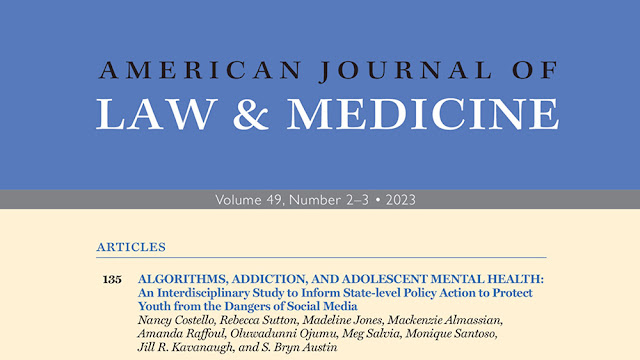PROTECTING YOUTH FROM DANGERS OF SOCIAL MEDIA
Published Online by Cambridge University Press: 12 February 2024
A recent Wall Street Journal investigation revealed that TikTok floods child and adolescent users with videos of rapid weight loss methods, including tips on how to consume less than 300 calories a day and promoting a “corpse bride diet,” showing emaciated girls with protruding bones.
The investigation involved the creation of a dozen automated accounts registered as 13-year-olds and revealed that TikTok algorithms fed adolescents tens of thousands of weight-loss videos within just a few weeks of joining the platform. Emerging research indicates that these practices extend well beyond TikTok to other social media platforms that engage millions of U.S. youth on a daily basis.
Social media algorithms that push extreme content to vulnerable youth are linked to an increase in mental health problems for adolescents, including poor body image, eating disorders, and suicidality. Policy measures must be taken to curb this harmful practice.
The Strategic Training Initiative for the Prevention of Eating Disorders (STRIPED), a research program based at the Harvard T.H. Chan School of Public Health and Boston Children’s Hospital, has assembled a diverse team of scholars, including experts in public health, neuroscience, health economics, and law with specialization in First Amendment law, to study the harmful effects of social media algorithms, identify the economic incentives that drive social media companies to use them, and develop strategies that can be pursued to regulate social media platforms’ use of algorithms.
For our study, we have examined a critical mass of public health and neuroscience research demonstrating mental health harms to youth. We have conducted a groundbreaking economic study showing nearly $11 billion in advertising revenue is generated annually by social media platforms through advertisements targeted at users 0 to 17 years old, thus incentivizing platforms to continue their harmful practices.
We have also examined legal strategies to address the regulation of social media platforms by conducting reviews of federal and state legal precedent and consulting with stakeholders in business regulation, technology, and federal and state government.
While nationally the issue is being scrutinized by Congress and the Federal Trade Commission, quicker and more effective legal strategies that would survive constitutional scrutiny may be implemented by states, such as the Age Appropriate Design Code Act recently adopted in California, which sets standards that online services likely to be accessed by children must follow.
Another avenue for regulation may be through states mandating that social media platforms submit to algorithm risk audits conducted by independent third parties and publicly disclose the results. Furthermore, Section 230 of the federal Communications Decency Act, which has long shielded social media platforms from liability for wrongful acts, may be circumvented if it is proven that social media companies share advertising revenues with content providers posting illegal or harmful content.
Our research team’s public health and economic findings combined with our legal analysis and resulting recommendations, provide innovative and viable policy actions that state lawmakers and attorneys general can take to protect youth from the harms of dangerous social media algorithms.



Comments
Post a Comment